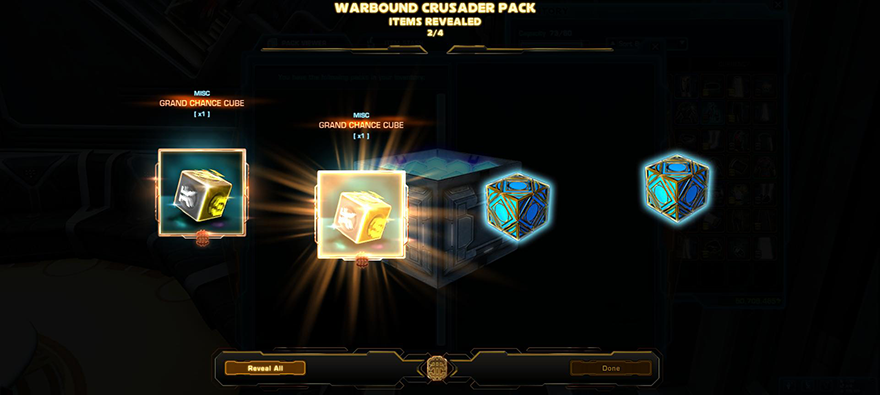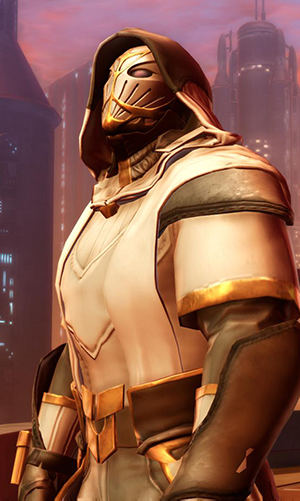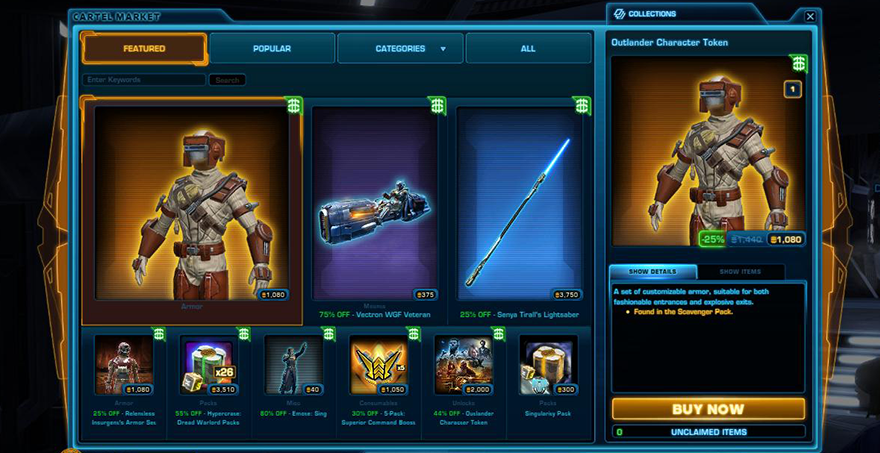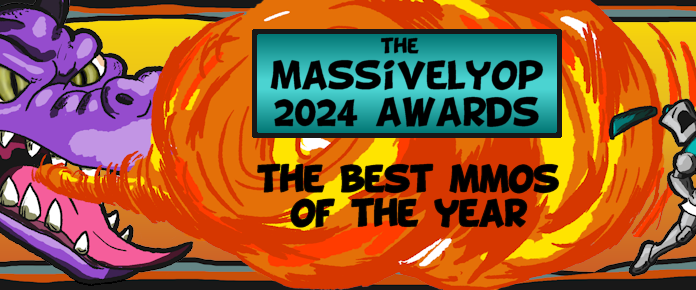
Because Star Wars: Battlefront II was the target of the latest lockbox controversy, I wondered what it would mean for EA’s Star Wars: The Old Republic, which has long been criticized for it’s handling of lockboxes and cash shop. The simple answer is that it probably will not affect the game much at all because as I understand it, SWTOR follows most of the existing gambling regulations for Belgium. BioWare or Electronic Arts would just have to file for an online gambling license.
Is this just the beginning, though? What if other European countries follow suit and started calling lockboxes and lootboxes gambling?

The sticking point with Belgium
According to Thomson Reuters, under Belgian law, EA would have to reveal “its policy for the accessibility of games of chance for socially vulnerable groups,” which would include underage groups that might be playing the game. As much as I hate to advocate on behalf of gambling, I do need to mention that SWTOR is already rated PEGI 16 in the EU, which means that the target audience isn’t small children. But I suspect that EA would still have to employ some sort of failsafe in SWTOR to prevent young children from gaining access to the lockbox mechanics.
On a larger scale, the PEGI rating for SWTOR might have to change. Currently, the only strikes against the game are Online Gaming (meaning that it can’t regulate online chatter) and violence. However, if SWTOR were forced to add gambling to its PEGI strikes, it might be forced into a PEGI 18 rating. It’s possible that the game could survive with that rating, but it does narrow its target market.
If this gambling stipulation stays with Belgium, then it’s doable. EA might have to reevaluate whether SWTOR is worth it because it would not only have to pay the Disney license to carry the Star Wars name but have to pay to have a gambling license in Belgium. Most likely, EA would buy a blanket license for all its games, which could cost 250,000 EUR (~300,000 USD) at most or 75,000 EUR (~90,000 USD) at minimum.
 Spreading to the rest of the EU
Spreading to the rest of the EU
EA and SWTOR will start to run into trouble if the rest of the EU states adopt the same policies. For instance, Poland has officially banned gambling except for sports gambling. And to operate legitimately in that country, EA would have to have a totally different gaming system. Many sites bypass Poland’s strict laws by operating within other countries, but that’s far from legitimate.
Poland wouldn’t be the only issue, as according to GamblingSites.org, other countries like France as Germany have complicated and rigorous licensing processes. EA would have to make sure that they abide by all the different regulations for each country. Unfortunately for EA, there is no blanket European Union policy regarding gaming. Some countries like Poland allow sports gambling but not cards or slots. Other countries have government-sanctioned monopolies on gambling. It might start to become too much of a chore for global gaming congloms.
What about the US?
The US is the largest market for SWTOR by far. And fortunately for EA, the only state speaking out so far is Hawaii. However, State Representative Chris Lee took a very hard stance against loot boxes in his Reddit post yesterday.
“These kinds of lootboxes and microtransactions are explicitly designed to prey upon and exploit human psychology in the same way casino games are so designed. This is especially true for young adults who child psychologists and other experts explain are particularly vulnerable. These exploitative mechanisms and the deceptive marketing promoting them have no place in games being marketed to minors, and perhaps no place in games at all.”
And all the lockbox critics cheered. If the US – on a federal or even state level – starts to recognize lootboxes as gambling, it could mean the literal end of many games that have too boldly staked their entire business model on these mechanics. SWTOR might be one of them.

What will SWTOR do?
Personally, I don’t want to see games like SWTOR shut down, so what could SWTOR do to adapt if this definition of gambling becomes legal? I think SWTOR‘s already gearing that direction.
There have already been huge pushbacks from SWTOR players about the way EA is handling Cartel Packs, and BioWare has been offering more and more direct sales. In fact, in a recent update to the Cartel Market, BioWare expanded the items that it sold as direct sales, and it’s also started pushing limited-time direct sale items that have been popular in the past to help boost the overall market viability. Many brand-new armor sets, as well as popular weapons, have popped in direct sales.
I like to think that SWTOR could make it through a switch from lockbox to direct sales. But we would definitely see an increase in limited-time items, and we might see an increase in the cost of Cartel Coins or the price of items themselves.
What do you think of the impending regulation? Do you think it will spread? I think there will ultimately be major changes in US law because of these statements from officials. Do you think your country’s laws will have to be rewritten? But I guess the most important question is: Are for or against this definition of lootboxes and lockboxes? What do you think will happen? Let me know in the comments, and I will continue this conversation in the comments.












